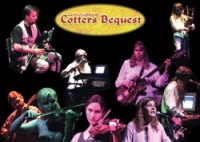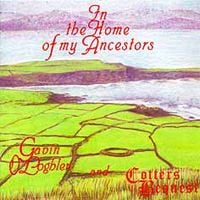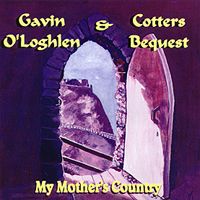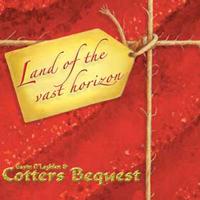
Cotters Bequest is an Australian six piece progressive Celtic band formed in 1996 playing 28 instruments and characterised by Highland, Uilleann, Northumbrian and Scottish smallpipes, Irish whistles, violin, cello and accordion wrapped in layers of acoustic and electric guitars, vintage keyboards, samplers and rich vocal harmonies. The nucleus of Cotters Bequest has come from the Celtic fusion band "Lochrien" and they have continued to develop the melding of traditional Celtic instruments and modern electronic equipment to create an unique sound in Australian Celtic music. The band's smooth vocals are performed in 10 languages.
The music is in the style of "a Celtic King Crimson.... a Pink Floyd with bagpipes..", with a sprinkling of Peter Gabriel.
I got in touch with the band and Gavin O'Loghlen answered my questions.
################################################################################
Your biography has been covered in your ProgArchives profile so let's bypass the
biography details. But which bands were you influenced by and why did you choose
that Cotters Bequest name ?
As a band we are known for producing a kind
of progressive Celtic music that features traditional Celtic instruments
together with banks of keyboards, guitars and vocal harmonies. As a piper, the
Celtic artists I enjoy are Wolfstone, Carlos Nunez and Gordon Duncan. As a sound
I like that big symphonic feel and I suppose early King Crimson, Pink Floyd and
Genesis rate pretty high. And as for song structure, its a mixture of classical:
Mussorgsky; progressive: Yes and folk tunes. I would also have to add that as my
background is in theatre, I am also influenced by that concept of a soundscape,
mood or atmosphere in the music which conveys a sense of time, place and
feeling. In this regard the theatre work of Jerzy Grotowski and Peter Brook also
influence the style of music we play.
My ancestors were Irish and on
both sides of my family tree came from County Clare, Ireland and were "Cotters",
(an Irish term) or landless peasants, who worked a section of land for an
absentee landlord in return for a small hut and potatoes they grew themselves.
There are no relics or memorabilia of these people who came to Australia after
the Potato Famine of 1845 - 1850, their sole bequest to me was an interest in
music, language and culture. Hence the name "Cotters Bequest".
This is an
archive based interview also intended for the fans you get well after both you
and I have passed away so let's go straight to your albums. Please give us your
long or brief views on your albums, starting with.......

In The Home
Of My Ancestors from 1997
This album followed on from a band called
"Loch'rien" which was formed in 1996 and played at a number of festivals. It was
a fairly gentle folksy style of music which used bagpipes as the lead
instrument. It was really the success of this band and our first album that lead
me to form Cotters Bequest. In The Home Of My Ancestors traces the origins of my
ancestors from the Burren, County Clare, Ireland and the events in their lives
that lead to them leaving for Australia in 1854. Its a fusion of Irish Gaelic
language, pipes, whistles and fiddles with layers of keyboards, guitars and
vocals. Unlike traditional music, the compositions wander through a range of
melodies, keys and time changes and give a sense of travelling on a journey. The
compositions had a stronger edge to them than Loch'rien and the first
descriptions of "symphonic Celtic" began to appear.

My Mother's Country
from 1998
The material from this album was written at about the same time
as "Ancestors" and looked at the ancient monuments in Scotland, England,
Cornwall, Wales and the Isle of Man and the stories connected to them. We had
the same line up as "Ancestors" and toured and performed both these albums at
festivals and concert halls in South East Australia for a number of years.
However with Australia having a relative small population and an even smaller
audience for progressive Celtic music we soon saturated our market and scaled
back performing. It was really during this period that the Pink Floyd
comparisons began to be made - possibly because of the amount of musical gear we
managed to cram onto the stage. Getting on and off stage in 15 minute bites at
festivals was fun! We had to start loading backlines three acts before ours to
get all the gear onstage.
(Tasters and Tidbits - 2001 - now
deleted)
This was a small album of some new songs (which were later
reworked and appeared on "Horizon") and a couple of video clips of the band in
concert. The band members remained the same as the previous two albums. It was
meant to fill a gap which grew longer than we had planned it to be.

Land Of The Vast Horizon from 2006
This album continued the
journey of my ancestors from Ireland and picked up the story from their arrival
in Port Adelaide in 1854 until their deaths in 1911. The amount of research
needed for this album was staggering. There was almost nothing known of these
two Irishmen who came here apart from a few hazy family stories most of which
proved to be wrong. As a consequence the years seemed to slip past at an
alarming rate and the album slowly chugged on. The band featured the same
members with the exception of Suzie who had moved to Sydney to work in
journalism. The one significant change in the recording was this album was
recorded in hard disc whereas the previous albums had been recorded on ADATs. We
weren't restricted to a set number of tracks and as a result the opening song
features 120 tracks (but not all at once!!).
The Poet and the Priest
2007
This was a remixed and remastered album I had written and recorded
in 1989 for a good friend, but had never been released. There are no Celtic
overtones in this, it is more of a melodic conversation or journey centring on
the subject of depression and finding hope in your life. It is a true story
written from my own experiences and featured lots of guitars, Arps, Moogs and
Mellotrons. This was the only piece from that period that wasn't written for the
theatre. A number of reviews have compared it to early Genesis and the Gabriel
days, but I think its simpler in its structure than "Selling England" or
"Lamb".
It is my understanding you are working on a new album. Please
tell us more about this album.
In the Footsteps of Ghosts
The new
album is called "In the Footsteps of Ghosts" and is again an historical album
based on places, events and people in Tasmania, Australia. I began researching
this in 1994 and last year (2010) found a note in a book saying "idea for a
possible album??" You can't rush these things! This CD predates all the others
and some of the musical pieces were written then. Its probably time to come
clean on my writing style which consists of snatches of melodies and themes all
recorded and stored away waiting for the right musical vehicle to come along.
There are literally hundreds of these (once upon a time stored on tape, at least
now on computer for ease of location) and I dip into these for theatre projects
and eventually a number of them coalesce into songs on albums. This new album
features most of the original band members and also extra musicians who played
on previous albums. Its form continues in the style of progressive celtic,
except the songs have grown into 8 to 10 minute pieces that weave their way
through a number of moods and atmospheres. Again this features the very
unfashionable combinations of bagpipes and mellotron, moog and celtic harp, 12
strings and Irish whistles, while displaying 5 different forms of bagpipes -
Highland, Border, Smallpipes, Northumbrian, Uilleann all used in place of lead
guitars and synth solos.
Nerbellus of Blog
This album is planned for
release in 2013 to celebrate the 30 year anniversary of the the dark music
theatre production "Nerbellus of Blog" which was written, recorded and performed
in 1983. It was described in one review as being a cross between Lewis Carol and
Franz Kafka, a bleak post modern story of bewilderment set underground in the
pit. The music has no Celtic elements to it, and instead weaves a path through a
range of symphonic and progressive musical ideas. It has a ninety minute
continual soundtrack to which the performers sang, played, danced, puppetered,
mimed and acted. Although the music has been transformed to digital format it
needs to be edited, shortened, remixed and remastered.
Somewhere on the
Menin Road
This is the next Cotters Bequest project which has already
undergone quite a bit of research and musical development. It follows the story
of my daughter's two great grandfathers (on her mother's and father's sides of
the family) and their experiences in Europe during the great war of 1914-18.
Although they came from other sides of the world - one England, the other
Australia - they passed each other during the night of 22 September 1917 on the
Menin Road in Belgium. One was pushing a stolen wheelbarrow (pinched from a
French farmer) full of radio equipment, while the other lay on a stretcher in
the middle of the road with his leg blown off. Little could they had known that
many decades later they would share the same great grand daughter. Eventually
they both returned to their home countries and lived till old age. Again a lot
of the music for this album has been written during the same period as "In the
Footsteps of Ghosts" and as such has a similar feel. However I think the musical
pieces will probably merge together in one continuous piece rather than exist as
separate tracks. Or perhaps not.
How would you describe your musical development from In The Home Of
My Ancestors to your latest recording ?
As I have said previously
many of the pieces of music have been written for some years and sit around
waiting for the right project to turn up and choose them. Consequently there
isn't really a great demarcation of styles and compositions with each album. I
also think the liberty of digital recording and unlimited tracks (almost) had
added a density to the sound as I continue to squeeze just another little
musical idea into each piece of music. In the early days of ADAT we would use
one bagpipe track, now we use five. The first four albums all used Celtic
languages - Scottish, Irish and Manx gaelic, Cornish and Welsh with German,
Latin and two indigenous Australian languages, whereas Ghosts is performed
entirely in English. I don't know what the Menin Road will do, we're still quite
a way from lyrics yet.
Your music is based on the Celtic music
tradition, both the Borders and Highlands of Scotland and the Irish Celtic
traditions. You are based in Australia though. From where in these islands do
you originate and what brought you to Australia ? Please also tell us about your
connection to Scotland and Ireland and please also tell us more about the
Australian Celtic music scene.
We do borrow from a range of Celtic
traditions and use both languages and traditional instruments, but not
traditional music forms and styles. I am a fourth generation Australian, but
some hidden gene had sparked a fascination with Celtic music that began at the
age of 11 by my choosing bagpipes over guitar heros! I love the sounds of pipes
and when I hear them I think Dave Gilmour, Robert Fripp and Steve Hackett. The
Australian Celtic music scene is very small, but very strong. We boast former
world champion Highland pipe bands and in my humble opinion Jack Brennan is one
of the world's best Uilleann pipers. However we are a country of 24 million
people, with about 18 million of them country music fans, so the Celtic music
communities are small but intense.
Your music has been compared to King
Crimson, Peter Gabriel and Pink Floyd though. But how would you describe your
music ?
Well this is hard. It has strong celtic elements to it, a
huge range of Celtic instruments, Celtic languages and musical folk melodies
that stick in your head. At the same time it doesn't follow traditional forms of
verse / chorus, but moves through a number of musical tunes, keys, different
time signatures and styles. It uses layers of instruments - acoustic 6 and 12
strings, electric guitars (no leads), Irish whistles (often four different keys
in the one song), and the full range of bagpipes as parts of an orchestra. Over
the top of these are layers of keyboards and synths and as I have a predilection
for old keyboard sounds, lots of Arps and Moogs, Hammonds and Mellotrons, Fender
Rhodes pianos and pipe organs soar above. The Peter Gabriel comparisons probably
come about from my croaking away in the background. However Angelee Theodoros
(another good Celtic name) has a stunning voice and takes most of the lead vocal
duties leaving me to provide the odd gasp or two.
There is some pretty
big gaps in your discography, time wise. What were you up to during those years
?
I probably need to explain my connection to music and the music
industry. My background is in theatre, my degree is in drama and I have worked
in music theatre for many years. I also own and run a recording studio which
records a whole range of musical styles as well as commercial voice overs etc.
So during the past ten years, in addition to the Cotters Bequest and solo
albums, I have been the music director, composer, musician and recording
engineer for 21 theatre productions. When you bear in mind that some of these
projects have resulted in up to 70 minutes of original music being written and
recorded, you can see I haven't been idle. And in terms of the recording studio
- in the last two years it has produced 35 albums, unfortunately none of them
mine, but a number of the artists also appear on Cotters Bequest albums.
Sometimes its hard to get excited about your own musical project when you've
just spent 70 hours a week in the studio working on music. In that respect I'm
no different to anyone else - work seems to get in the way of our
passions!
What are your experiences with the music industry and the gigs
promotors ?
I've always been independent and not connected to any of
the major labels as such. Experience has shown that the market for our music is
really too small for a major label to take the risk and so we distribute through
a number of overseas outlets. Its very hands on and personal, CD sales occur
through websites and the clients often get the artist posting off the CD to
them. My experience of the major labels has come from playing on other people's
CDs which were marketed through the usual channels. The financial returns that
came back to the artist were very small, often as little as one dollar per CD
sold. We never used promoters for our concerts and tours - I used my contacts
and booked theatres directly so I can't really comment on the live music
scene.
What are your plans for this year and beyond ?
The big plan
for 2011 is to finish "In the Footsteps of Ghosts" this year, then start to get
the "Menin Road" project sorted out in a little more detail. I would then like
to get "Nerbellus" edited and tidied up for a 2013 release. It all depends on
the workload in the studio, but I can't complain as I get to work in music for a
living with nice people and lots of creativity.
To wrap up this
interview, is there anything you want to add to this interview ?
Thank
you for your interest in what we are doing down under. I was chatting with Mark
Trueack from Unitopia (another local Adelaide band) the other day and we were
both feeling very positive about the interest from Europe and the UK in our
different music. It can get pretty isolated working in the small obscure genre
of progressive music in Australia, so its great to find that someone else out
there in the big wide world is interested in what we are doing.
Thank you to Gavin for this interview
Their PA profile is here and their homepage's here
/PAlogo_v2.gif)


